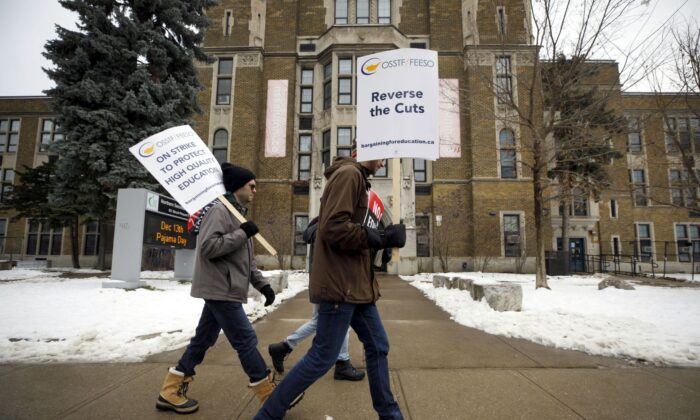IG Michael Horowitz: ‘Text Messages’ Contained Evidence of ‘Political Bias’ at FBI
News Analysis
Ontario teachers are continuing with their job action over Bill 124, with the government insisting that the Ontario Secondary School Teachers’ Federation cares more about compensation than the quality of education and protecting students, and the union accusing the government of failing to address concerns like larger classroom sizes and mandatory online courses.
A third one-day strike closed high schools at 10 boards across the province on Dec. 18, while mediators advised earlier this week that contract talks between the union and the government be put on hold until the new year given that negotiations had stalled.
An explanatory note accompanying Bill 124 states that the bill’s purpose is to ensure that increases in public sector compensation reflect Ontario’s fiscal situation, are consistent with the principles of responsible fiscal management, and protect the sustainability of public services.
Jasmine Pickel, the Ontario communications director for the Canadian Taxpayers Federation, said the 2 percent wage increase the teachers’ unions are demanding would place an untenable burden on taxpayers.
“Over three years (since the government has offered 1 percent each year for the next three years), the current offer would cost taxpayers over $2 billion. If raises were increased to 2 percent every year to keep up with inflation, it would cost taxpayers nearly $7 billion,” she said in an interview.
“Given that the province is already projecting a $9 billion deficit this year, any further raises for teachers will have to be funded by increasing taxes and increasing the debt.”
In a report on education spending in Canada released in January 2019, the Fraser Institute found that compensation accounts for most of the spending increases. In Ontario, spending on compensation (including salaries, fringe benefits, and pensions) increased from $14,986 in 2006–07 to $20,791 in 2015–16, representing an increase from 74.2 percent to 78.3 percent of total education spending. This was concurrent with a decrease in enrolments in public schools from 2,103,465 students in 2006–07 to 1,993,431 students in 2015–16.
“It is clear from the data presented that every province in Canada over the 2006–07 to 2015–16 period increased education spending beyond what was required to account for enrolment changes and inflation,” the authors wrote.
“This means real increases in per-student education spending in public schools across the country, which is contrary to the general perception that education spending in public schools has been cut.”
Lisa Bildy, a lawyer with the Justice Centre for Constitutional Freedoms, says the constitutional complexities of Bill 124 and the challenge to the Charter of Rights and Freedoms being mounted by four teachers’ unions could cause trouble for the government.
“The jurisprudence from the Supreme Court of Canada on section 2 (d) of the Charter has evolved from simply guaranteeing the freedom of individuals to form associations, to giving unions a right to insist that the collective bargaining process not be overridden,” she said. “This is now considered sacrosanct, and putting in place a legislated outcome that isn’t arrived at through a good-faith collective bargaining process will likely be found to be in breach of section 2 (d) of the Charter.”
“Although Bill 124 declares that collective bargaining and the right to strike are preserved, striking loses its effect when the outcome on significant issues is predetermined. The question for the court will be whether meaningful collective bargaining was substantially interfered with by this legislation.”
This article is from the Internet:Ontario Teachers Hold Third One-Day Strike as Talks Stall
Trump Order Gives Federal Employees a Day Off for Christmas Eve
